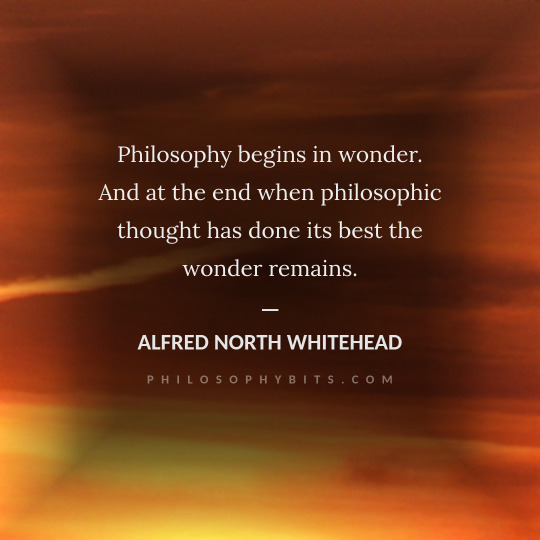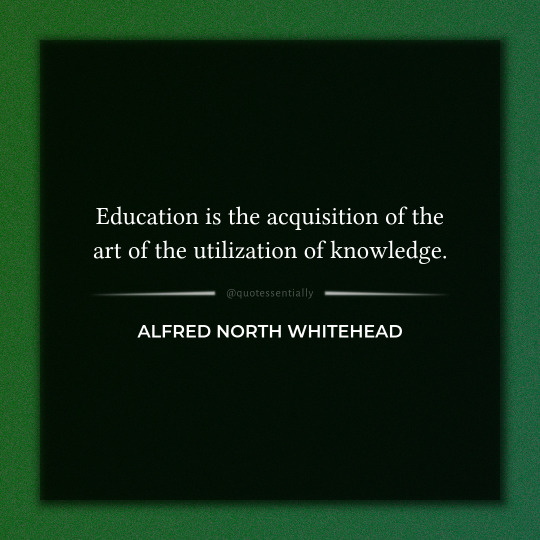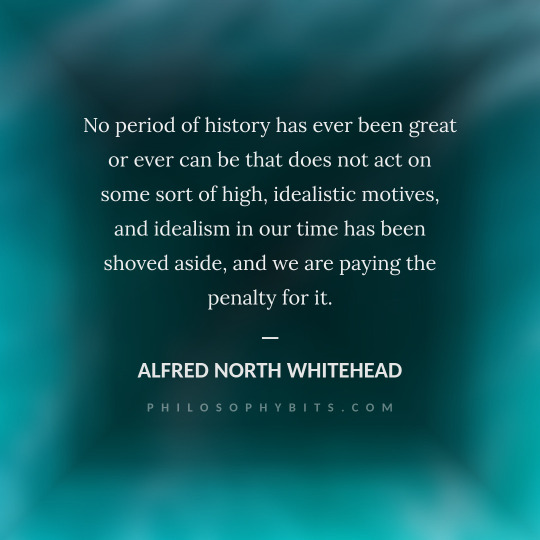#Alfred North Whitehead
Text

#philosophy#quotes#Alfred North Whitehead#Modes of Thought#Whitehead#wonder#uncertainty#paradox#thought#thinking#reason
55 notes
·
View notes
Quote
Our minds are finite, and yet even in these circumstances of finitude we are surrounded by possibilities that are infinite, and the purpose of human life is to grasp as much as we can out of the infinitude.
Alfred North Whitehead, Dialogues
#philosophy#quotes#Alfred North Whitehead#Dialogues#life#humanity#limitations#finitude#possibilities#infinity
272 notes
·
View notes
Text

Palter, Robert. “The Place of Mathematics in Whitehead’s Philosophy.” The Journal of Philosophy, vol. 58, no. 19, 1961, pp. 565–76.
15 notes
·
View notes
Text

From Alfred North Whitehead’s The Aims of Education
16 notes
·
View notes
Text

* * * * *
“The mind is never passive; it is a perpetual activity, delicate, receptive, responsive to stimulus. You cannot postpone your life until you have sharpened it. Whatever interest attaches to your subject-matter must be evoked here and now; whatever powers you are strengthening in the pupil, must be exercised here and now; whatever possibilities of mental life your teaching should impart, must be exhibited here and now. That is the golden rule of education, and a very difficult rule to follow. […] The solution which I am urging, is to eradicate the fatal disconnection of subjects which kills the vitality of our modern curriculum. There is only one subject-matter for education, and that is Life in all its manifestations. Instead of this single unity, we offer children - Algebra, from which nothing follows; Geometry, from which nothing follows; Science, from which nothing follows; History, from which nothing follows; a Couple of Languages; never mastered; and lastly, most dreary of all, Literature, represented by plays of Shakespeare, with philological notes and short analyses of plot and character to be in substance committed to memory. Can such a list be said to represent Life, as it is known in the midst of the living of it? The best that can be said of it is, that it is a rapid table of contents which a deity might run over in his mind while he was thinking of creating a world, and has not yet determined how to put it together.”
— Alfred North Whitehead, “The Aims of Eduction” (1929)
[weil-weil]
17 notes
·
View notes
Text
A single fact in isolation is the primary myth required for finite thought, that is to say, for thought unable to embrace totality. This mythological character arises because there is no such fact. Connectedness is of the essence of all things of all types. It is of the essence of types, that they be connected. Abstraction from connectedness involves the omission of an essential factor in the fact considered. No fact is merely itself. (...) It follows that in every consideration of a single fact there is the suppressed presupposition of the environmental coordination requisite for its existence.
Alfred North Whitehead, "Importance", Modes of Thought
9 notes
·
View notes
Text
“All modern philosophy hinges round the difficulty of describing the world in terms of subject and predicate, substance and quality, particular and universal. The result always does violence to that immediate experience which we express in our actions, our hopes, our sympathies, our purposes, and which we enjoy in spite of our lack of phrases for its verbal analysis.”
—Alfred North Whitehead. Process and Reality.
50 notes
·
View notes
Text
Rightness of limitation is essential for growth of reality.
Unlimited possibility and abstract creativity can procure nothing. The limitation, and the basis arising from what is already actual, are both of them necessary and interconnected.
– Alfred North Whitehead, Religion in the Making
#limitations are set only then can we go all the way#virtuality masquerading as actuality#alfred north whitehead#religion in the making
18 notes
·
View notes
Text

What if all works of art were better understood as functioning apparatuses, entangling their human audiences in experiences of becoming? What if certain works of art were even able to throw the brakes on becoming altogether, making nothings rather than somethings? What would be the ethical value of making nothing, of stalling becoming; and how might such nothings even be made?Some Ways of Making Nothing: Apophatic Apparatuses in Contemporary Art borrows its understanding of apparatuses from quantum mechanics and the process philosophy of Alfred North Whitehead, and its understanding of nothing from apophatic (negative) theology. It then proposes a new way of understanding art, applying this understanding to artworks by Arakawa and Gins, Robert Fludd, David Crawford, Joshua Citarella, William Pope.L, and Haim Steinbach. Philosophy, physics, theology, and media theory are traversed and involved in order to understand art differently so that it might be made to matter more.
Some Ways of Making Nothing: Apophatic Apparatuses in Contemporary Art : Curt Cloninger : Free Download, Borrow, and Streaming : Internet Archive
4 notes
·
View notes
Text
"'God's own life is an adventure, for the novel enjoyments that are promoted among the creatures are then the experiences providing the material for God's own enjoyment. 'The Unity of Adventure includes the Eros which is the living urge towards all possibilities, claiming the goodness of their realization.' (AI 381.) And God's life is also an adventure in the sense of being a risk, since God will feel the discord as well as the beautiful experiences involved in the finite actualizations: 'The Adventure of the Universe starts with the dream and reaps tragic Beauty.'" - John B. Cobb, Jr., David Ray Griffin; Process Theology: an Introductory Exposition
#john cobb#david ray griffin#whitehead#alfred north whitehead#process theology#process philosophy#christian#progressive christianity
2 notes
·
View notes
Text

#philosophy#quotes#Alfred North Whitehead#Dialogues#Whitehead#idealism#ideals#optimism#hope#progress
14 notes
·
View notes
Quote
What is morality in any given time or place? It is what the majority then and there happen to like, and immorality is what they dislike.
Alfred North Whitehead, Dialogues
#philosophy#quotes#Alfred North Whitehead#Dialogues#morality#rules#norms#conventions#society#humanity
123 notes
·
View notes
Text
There are two main motivations [for Whitehead’s method of extensive abstraction] worth highlighting. One relates to Whitehead’s endorsement of the relational theory of space (and, eventually, time and spacetime), i.e., the view that geometric entities are not among the fundamental constituents of reality but rather emerge entirely from relations between concrete objects and events, which he took to be inconsistent with the simplicity of sizeless points. The other lies in Whitehead’s overall epistemology, and particularly his radical empiricist methodology in the philosophy of science.
The first motivation is already present in the 1906 memoir, where the relational theory is identified generically with ‘Leibniz’s theory of the Relativity of Space’. …
…
… According to Whitehead, science is ‘the thought organization of experience’ (Whitehead, 1916c, p. 411). It is ‘founded upon observation’ and all scientific constructions are ‘merely expositions of the characters of things perceived’ (CN, pp. 57, 148). Since the points of Euclidean geometry appear to be ‘a metaphysical fairy tale by any comparison with our actual perceptual knowledge of nature’ (PNK, p. 6), it follows that geometry itself, for all its scientific usefulness, cannot be taken at face value. It must involve some sort of abstraction, a ‘fiction’ of sorts (Whitehead, 1917, p. 163), and a proper investigation into its foundations must fully expose the abstract character of this fiction. Here is where Whitehead’s philosophical stance may be seen as continuous with traditional anti-indivisibilist views. But, more importantly, here is where his account is meant to fill the holes left open by his predecessors. For Whitehead is not only rejecting the indivisibilist ontology of classical geometry; he is also giving us an actual method for recovering its truths on empirically acceptable grounds. His goal is to provide a fully-fledged point-free foundation of geometry.
It is worth emphasizing that for Whitehead this is not a peculiar task, as if geometry were in some sense unique in delivering a misleading picture. On the contrary, it is an instance of what Whitehead considered the primary task of scientific philosophy at large: to exhibit the systematic connection between the neat and tidy ‘world of ideas’ with which science ends and the untidy, ill[1]adjusted field of ‘sensible experiences’ from which it begins (Whitehead, 1916c, p. 41). Whitehead discussed many examples of this task, and of the ‘fallacy of misplaced concreteness’ that arises whenever the ‘abstract logical constructions’ used in science and mathematics are mistaken for ‘concrete facts’ out of which they arise (Whitehead, 1926, p. 64). The abstractions involved in geometry are no exception, and the method of extensive abstraction is intended to provide the relevant connection in such a way as to avoid the fallacy.
Achille C. Varzi, “Points as Higher-Order Constructs: Whitehead’s Method of Extensive Abstraction,” The History of Continua: Philosophical and Mathematical Perspectives
11 notes
·
View notes
Text

From Alfred North Whitehead’s The Aims of Education
11 notes
·
View notes
Text
The purpose of thinking is to let the ideas die instead of us dying.
Alfred North Whitehead, Source Unlisted.
#philosophy tumblr#philoblr#englishphilosophy#english writers#polymath#alfred north whitehead#phenomenology#metaphysics#thinking#critical thinking#ideas#thought processing
13 notes
·
View notes
Text
No one ever says, Here I am, and I have brought my body with me.
Alfred North Whitehead, Modes of thought, p. 114.
5 notes
·
View notes